
The grocery store chain donates $5,000 to help the Institute continue to alleviate food insecurity.
The IHP’s foray into helping ease food insecurity received a significant boost of confidence February 17 when representatives of the Stop & Shop School Food Pantry Program toured the IHP Community Pantry, an entity it donated $5,000 to.
Gathered in Building 39, where the pantry was introduced to the IHP almost a year ago, the grocery store representatives saw the stocked shelves, the variety of offerings, the storage and signage, and how well it blended in with the adjacent student and faculty lounge.
“I love this pantry because of the openness about it,” said Cindy Sailer, a charitable giving and community relations specialist with the store’s program. “It doesn't look like a pantry at all. It looks like a kitchen where you would get something to eat. I love it.”
“It’s very welcoming,” added Maria Fruci, the program’s manager. “And it helps destigmatize what a traditional pantry looks like.”
The grocery store’s program works with more than 160 schools – from pre-kindergarten through graduate schools - to fight food insecurity, a silent problem on college campuses.
“With higher ed specifically, it is something that's not talked about, but it's existed and existed for a long time,” said Fruci. “There’s a difference between needs and wants. You learn it pretty quickly when you're on your own and you don't have money to just simply purchase food. You need food to stay focused and fueled and further your education.”
The IHP Community Pantry was launched in April 2022 to combat food insecurity. It was the brainchild of Mike Boutin, assistant dean for faculty and student success in the School of Health and Rehabilitation Sciences, Jessica Bell, director of library and instructional design, and Luella Benn, director of accessibility resources and wellness in the Office of Student Affairs and Services. All had been hearing how some students were missing meals because they just didn’t have enough money.
"The idea that some of our students were struggling with food insecurity was both sad and eye opening to us,” said Boutin. “But once we realized that, we knew we had to do something."
Created with start-up funds from the IHP, the self-service pantry is in an easily accessible location that’s in a high-traffic area to help remove any stigma attached to using it. Staffed by volunteers, the pantry offers peanut butter, boxes of pasta, cans of tuna and soup, bags of beans, and personal care products such as deodorant and shampoo.
The increasing dependence of the pantry – and positive feedback - has confirmed the initial need.
“We had one student say, ‘Thank you. I'm able to eat regularly,’” said Benn. ‘We had another student say, ‘This is contributing to my success because I don't have to worry about where my next meal is coming from and where groceries are coming from.’ That’s really powerful.”
According to a 2019 Real College Survey for the Massachusetts Public Higher Education System (the most recent report), 37% of respondents experienced food insecurity while 20% of food-insecure students utilized Supplemental Nutrition Assistance Program (SNAP) benefits, factors that can affect a student’s ability to concentrate on their studies or lead to their dropping out.
Since its launch, the pantry has distributed more than 2,500 items and raised more than $7,500. Additionally, more than 1,000 items have been donated through various events including the kick-off drive; a 5K walk and run organized by the Staff Council Community Service Committee and Alumni Relations, and the faculty/staff holiday party.
“I get to see people use it and get excited about the fact that they can have fruit for the first time in a week and where they have a meal plan for the day,” said Emily “M” Myer, the accessibility & wellness coordinator in the Office of Student Affairs and Services who has helped run the food pantry. “I always call it bittersweet because, thank goodness, we're able to meet a need but the fact that the need is there in the first-place leads to a bigger conversation.”
The Stop & Shop grants comes at a pivotal time for the pantry; it’s been over budget due to unexpectedly high demand – a proof point of food insecurity at the IHP and the need for the pantry.
As it prepares to enter Year 2, organizers are eyeing expansion. Seeking a variety of avenues for community partnerships is on the table along with adding fresh food and academic supplies.
“We're always looking for student feedback about what we might need,” said Benn.
Do you have a story the Office of Strategic Communications should know about? If so, email ihposc [at] mghihp.edu (ihposc[at]mghihp[dot]edu).
